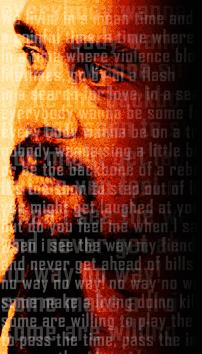| |
Taken from Media Education Foundation (Feb, 2002)
9/11, Vulnerability, Music and Hope
 |
My first reaction, my first emotion I had, was the sense of feeling of having the wind knocked out of me, like, "Wow. Is this really happening?" You know? And a sense of shock and disbelief, horror.And then within minutes, there [were] already pundits-the 'punditocracy'was on TV-trying to explain what happened-who did it, who was responsible and how we were going to go get them.And I was horrified to see that they were already constructing this whole mythology for war. And so what I did was I just tried to turn off the TV, and I just tried to be with the feelings. And I imagined, do I know anyone in New York who was working around there at the time? And really just try to live with the feelings of sadness, of mourning. And in the days following that, too, I didn't go out and do-you know I got a lot of requests to do interviews and whatnot, and I said, "No, this is a time of mourning for me, and I want to just stay with those feelings." Because I thought, I want to be able to hold onto those feelings that whatever actions I took next would be guided by those emotions, and I didn't want to be guided by my anger at the media or my anger at the government.I wanted to be guided by my sense of connection to humanity.
And so the next thing we did was the Sunday following that Tuesday we organized a concert in San Francisco with some people from Global Exchange, and it was a concert that declared San Francisco a hate-free zone. And we teamed up with some Arab and Muslim businesses in San Francisco who were under attack and getting threats and having windows broken and whatnot. And we brought together musicians from the Arab and Muslim communities, as well as the Jewish community and others, to perform music and a concert to try to bring together the peace community.And traditionally, San Francisco has always been known for its activism, as well as New York, but we all felt like with what had happened with this event taking place in New York, it was going to be hard for people in New York, especially, to be really as vocal as we could be on the west coast. So we wanted to bring that community together-and together in peace, together not in anger. And to say, you know, "Although we're mourning, and although we're sad, this is not a cry for war."
And I think that music is one of the final frontiers.
Music is one place where you can still have the ability to write a song and get up on stage with a guitar and say it to a few people.And after all this stuff has gone on, I've been studying a lot of Buddhism, reading people like Thich Nhat Hanh, and in Buddhism, they talk about happiness as being the relief from suffering and that all of us our suffering all the time-through our stress of life, through economic injustice, through political injustice, military injustice, or just the internal turmoil we have from things that have happened in our lives, stresses about our hopes for the future. And to bring about relief from suffering should be a goal for us in terms of creating happiness in the world. And through music, I see a way of doing that.I see that if just through the notes of soothing of somebody or helping somebody to get out their anger or their frustration out through the intensity of the music in a safe way that that is a relief from suffering. And sometimes, music has the ability to also convey words that mean something to people, that can help to relieve suffering. And art-practicing the expression of our emotions in a peaceful way, through creativity, through video, through film, through writing, through painting, through dancing, through creating food, through communing together, through making love, through whatever it is we can do to be creative-is helping to communicate that message in the world.
|
|